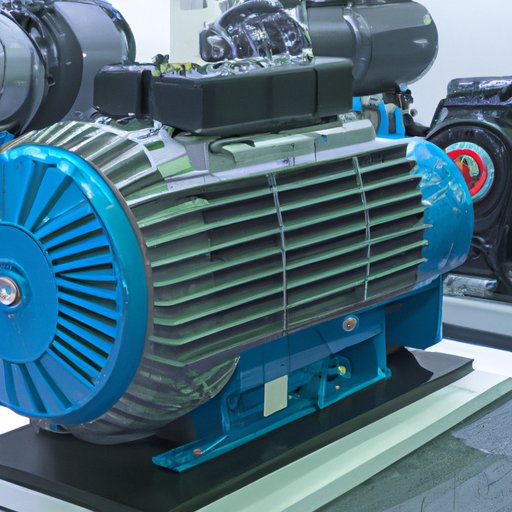Introduction
An electric generator is a device that converts mechanical energy into electrical energy. This conversion is done through the use of a rotating magnetic field which causes electrons to flow through a wire, creating an electric current. The power generated by an electric generator can be used for a variety of purposes, including powering homes and businesses, and providing backup power in case of a power outage.
The purpose of this article is to provide a comprehensive guide to understanding how an electric generator works. It will explain the basics of electric generators, the science behind generating electricity with an electric generator, different types of electric generators, the benefits and drawbacks of using an electric generator, and the cost-effectiveness of an electric generator.

Explaining the Basics of an Electric Generator and How it Works
An electric generator consists of several components, including a rotor, stator, field winding, and armature winding. The rotor is the part of the generator that rotates, while the stator is the stationary part. The field winding is the part of the generator that creates the magnetic field, and the armature winding is the part of the generator that produces the electric current. To start the electric generator, the rotor must be spun by an external source, such as a motor or turbine.
Once the rotor is spinning, the field winding creates a magnetic field which induces a current in the armature winding. This current is then sent through wires to the output terminals, where it can be used to power appliances or other devices. The amount of electricity generated by the electric generator depends on its size and design.

The Science Behind Generating Electricity with an Electric Generator
Generating electricity with an electric generator involves the use of Faraday’s law of induction. According to Faraday’s law, when a conductor moves through a magnetic field, a voltage is induced in the conductor. This voltage is what drives the electric current. In an electric generator, the rotor is rotated by an external source, creating a magnetic field which induces a voltage in the armature winding. This voltage is then sent through wires to the output terminals, where it can be used to power appliances or devices.
In addition to Faraday’s law, the generation of electricity also involves the use of Ohm’s law. According to Ohm’s law, the amount of current that flows through a conductor is proportional to the voltage applied to the conductor. In an electric generator, the amount of current produced depends on the strength of the magnetic field created by the field winding and the voltage induced in the armature winding.
Understanding the Different Types of Electric Generators
There are several different types of electric generators available, each with their own advantages and disadvantages. The most common types of electric generators are internal combustion engines, steam turbines, and hydroelectric generators. Internal combustion engines use gasoline or diesel fuel to generate electricity, while steam turbines use steam to generate electricity. Hydroelectric generators use the power of flowing water to generate electricity.
Each type of electric generator has its own benefits and drawbacks. Internal combustion engines are relatively inexpensive and easy to maintain, but they produce a lot of noise and air pollution. Steam turbines are more efficient than internal combustion engines, but they require a large amount of water to operate. Hydroelectric generators are the most efficient type of electric generator, but they require a large amount of land and can be expensive to install.

Examining the Benefits and Drawbacks of Using an Electric Generator
Using an electric generator has several advantages. Electric generators are reliable sources of power and can provide backup power during power outages. They are also versatile and can be used to generate power for a variety of applications. Additionally, electric generators are relatively easy to install and maintain.
However, there are some potential drawbacks to using an electric generator. Generators can be noisy, and they require regular maintenance to ensure they are running efficiently. Additionally, electric generators can be dangerous if not used properly and can cause fires or electrocution if not handled correctly.
Analyzing the Cost-Effectiveness of an Electric Generator
The cost of an electric generator depends on its size and type. Smaller generators tend to be less expensive, while larger generators can be more expensive. Additionally, certain types of electric generators may be more expensive than others due to the materials required for their construction. Maintenance costs for electric generators can also vary depending on the type and size of the generator.
When considering the cost-effectiveness of an electric generator, it is important to consider the total cost of ownership. This includes the initial purchase price, installation costs, and ongoing maintenance costs. For households or businesses that rely heavily on electricity, the cost savings from using an electric generator may outweigh the initial costs of purchasing and installing the generator.
Conclusion
Electric generators are reliable sources of power that can be used to provide backup power in case of a power outage. Understanding how an electric generator works is essential for safely operating and maintaining the device. This article provided a comprehensive guide to understanding how an electric generator works, including explaining the components and processes involved in generating electricity, the science behind it, different types of electric generators, the benefits and drawbacks of using an electric generator, and the cost-effectiveness of an electric generator.
Overall, electric generators can be a cost-effective solution for households or businesses that rely heavily on electricity. It is important to weigh the initial costs of purchasing and installing an electric generator against the potential savings in order to determine if an electric generator is right for you.
(Note: Is this article not meeting your expectations? Do you have knowledge or insights to share? Unlock new opportunities and expand your reach by joining our authors team. Click Registration to join us and share your expertise with our readers.)
